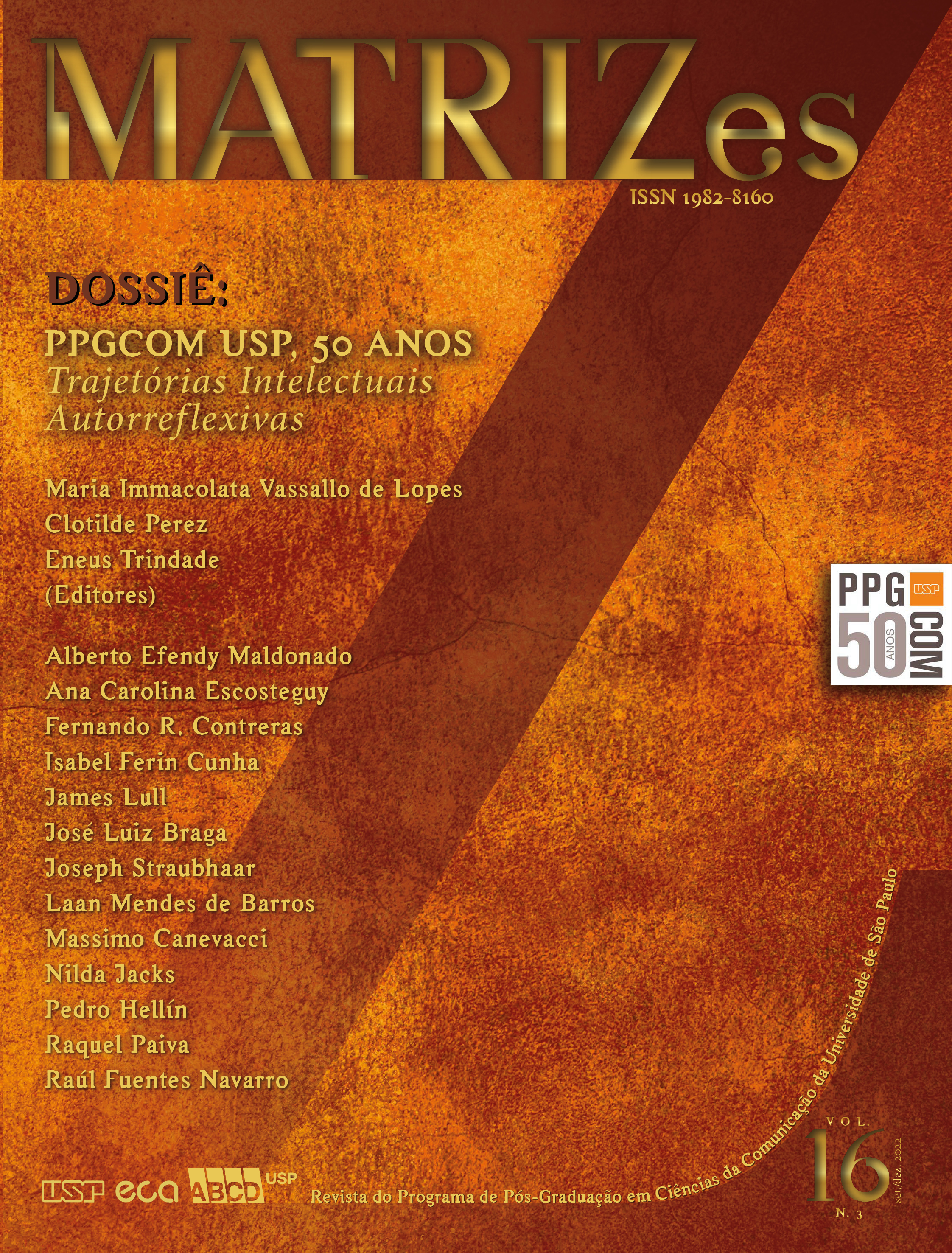From ethnography to evolution
DOI:
https://doi.org/10.11606/issn.1982-8160.v16i3p87-102Keywords:
Ethnography, Structuration, Evolution, Evolutionary communicationAbstract
The author reflects on the development of his epistemic approach to the study of communication and culture first by recounting key experiences he had as a boy and young man, especially travel. He traces the trajectory of his empirical study of media, culture, and communication by citing key scholars and literature as well as his experiences as a professional communicator. Professor Lull’s doctoral dissertation at the University of Wisconsin-Madison, an innovative ethnography of family life with television, set him on the path of qualitative empirical research for much of his early career. He mentions his article “The Social Uses of Television” and his ethnography of the arrival of television in urban China as his major research accomplishments. In the late 1980s, his focus turned to Latin America, where he has given numerous presentations, seminars, and workshops. His collaboration with the Brazilian-American communications professor Eduardo Neiva helped bring about a transition to his most recent work, the introduction of evolutionary communication as a theoretical alternative in the field.
Downloads
References
Black, E. (1965). Rhetorical criticism: A study in method. University of Wisconsin Press.
García Canclini, N. (1989). Culturas híbridas: Estrategias para entrar y salir de la modernidad. Grijalbo.
García Canclini, N. (1995). Consumidores y ciudadanos: Conflictos multiculturales de la globalización. Grijalbo.
Garfinkel, H. (1967). Studies in ethnomethodology. Prentice-Hall.
Giddens, A. (1984). The constitution of society. Polity Press.
González, J. A. (1994). Mas (+) cultura(s): Ensayos sobre realidades plurales. Pensar la Cultura.
Husserl, E. (1931). Ideas: General introduction to pure phenomenology. Macmillan.
Jankowski, N., & Jensen, K. B. (Eds.). (1991). A handbook of qualitative methodologies for mass communication research. Routledge.
Lindlof, T. (Ed.). (1987). Natural audiences: Qualitative research of media uses and effects. Ablex.
Lull, J. (1974). Counter advertising: Persuasiveness of the anti-Bayer television spot. Journal of Broadcasting and Electronic Media, 18, 353-360.
Lull, J. (1976). Mass media and family communication: An ethnography of audience behavior [Unpublished doctoral dissertation]. University of Wisconsin-Madison.
Lull, J. (1978). Choosing television programs by family vote. Communication Quarterly, 26(4), 53-57. https://doi.org/10.1080/01463377809369314
Lull, J. (1980). The social uses of television. Human Communication Research, 6(3), 197-209. https://doi.org/10.1111/j.1468-2958.1980.tb00140.x
Lull, J. (Ed.). (1988). World families watch television. Sage.
Lull, J. (1990). Inside family viewing. Routledge.
Lull, J. (1991). China turned on: Television, reform, and resistance. Routledge.
Lull, J. (1992a). A China ligada: Televisão, reforma, y resistência. Rio Fundo.
Lull, J. (1992b). La estructuración de las audiencias masivas. Día Logos, (32), 50-57.
Lull, J., & Neiva, E. (2008). Comunicar a mudança: A promessa da evolução humana. MATRIZes, 2(1), 49-74. https://doi.org/10.11606/issn.1982-8160.v2i1p49-76
Lull, J., & Neiva, E. (2012). The language of life: How communication drives human evolution. Prometheus Books.
Lull, J. (2020). Evolutionary communication: An introduction. Routledge.
Lull, J. (2021). Living with television and the internet. New Media and Society, 23(7), 1850-1862. https://doi.org/10.1177/14614448211019322
Lull, J. (2022). Approaching evolutionary communication. Communication Theory, 32(4), 429-438. https://doi.org/10.1093/ct/qtac017
Martín-Barbero, J. (1987). De los medios a las mediaciones. Grijalbo.
Schramm, W., & Roberts, D. (Eds.). (1971). The process and effects of mass communication. University of Illinois Press.
Schutz, A. (1967). A phenomenology of the social world. Northwestern University Press.
Downloads
Published
Issue
Section
License

This work is licensed under a Creative Commons Attribution-NonCommercial-ShareAlike 4.0 International License.
Authors who publish in this journal agree to the following terms:
- Authors retain the copyright and grant the journal the right to first publication, with the work simultaneously licensed under the Creative Commons Attribution License (CC BY-NC-SA 4.0) which allows sharing of the work with acknowledgment of authorship and initial publication in this journal for non-commercial purposes.
- Authors are authorized to assume additional contracts separately, for non-exclusive distribution of the version of the work published in this journal (eg, publishing in institutional repository or as a book chapter), with acknowledgment of authorship and initial publication in this journal.






















